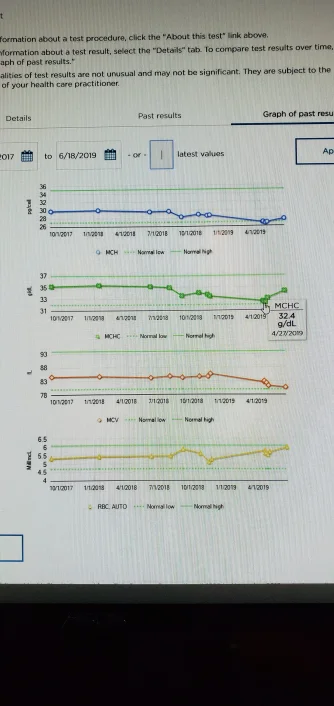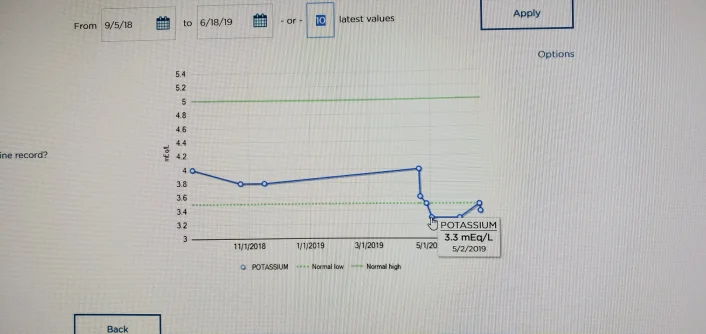I'm having a bit of realization, I had a complete CBC lab testing done yesterday and it would seem it matches those for 6 weeks ago when I was in the emergency room accept now I'm not on TRT and have been supplementing 650mg iron since 325 barely got me in range 2 weeks ago.
The symptoms are the same, last night the throbbing in the legs was do to high RBC, add below range potassium and thick blood and you have a recipe for vasoconstriction, throbbing in the legs and swelling in the abdomen.
I thought how could my symptoms be coming back, I'm not on TRT and then it hit me why I was having so much trouble on TRT. My natural labs listed below hint that I wasn't too far off the mark from optimal testosterone.
As of right now I have no idea what my natural Total T numbers are, testicles are actively moving and active, but seem to pull up a bit when potassium is low because cramping begins do to low potassium.
Last night when the ER doctor and I talked extensively, agreed with me and proceeded to prescribe a potassium pill which within 20 minutes cleared all symptoms of leg throbbing, abdominal throbbing and freezing cold feet was moving upwards towards my knees quickly became very hot and then back to normal, than again this morning was a repeat of last night, I took potassium and symptoms vanished.
Low iron and low potassium is a major electrolyte imbalance which resulted in the edema which then increase sodium which then required a diuretic which then lead to crushed potassium which is why I stopped taking the diuretic. I always wondered why I was so damn freezing when I was diagnosed with low testosterone even though TSH was .610/FT4 1.45/T4 8.5, vasoconstriction do to abnormally low iron and low potassium.
Every time I take my potassium, I feel amazing within a short while which is much faster than any T injection initial response and result. By the end of day it's as if I'm stable and balanced out.
-->Hypokalemia decreases testosterone production in male mice by altering luteinizing hormone secretion.
Potassium deficiency produced by feeding mice a low potassium diet caused a marked decrease in plasma and testicular testosterone concentrations and a concomitant fall in the weight of seminal vesicles and in renal ornithine decarboxylase activity.
All of these parameters were rapidly restored when potassium supply was normalized. Immunocytochemical analysis of gonadotropes and plasma LH values suggested that the pulsatile liberation of LH by the pituitary was impaired in the potassium-deficient male mice.
Because the synthesis of testosterone in the potassium-deficient mice was stimulated by exogenous LH, hCG, or GnRH, one can conclude that alteration of the transcellular potassium gradient could affect the regulation of the hypothalamo-hypophyseal-testicular axis by affecting the pulsatile release of GnRH.
Our results showing that the stimulation of LH secretion after castration was similar in control and potassium-deficient male mice suggest that a testicular factor(s) different from testosterone could be implicated in the abnormal regulation of LH secretion in potassium-deficient mice.
We conclude that plasma potassium concentration is an important factor in the regulation of gonadotropin secretion and testicular functions.
I cannot tolerate these CBC results even on TRT which means my natural optimal T is lower than 500 ng/dL which I have suspected for some time. The reason I had so many problems on TRT was an iron and potassium deficiency and I was pushing supraphysiological doses for me anyway.
If I really was naturally on the lower end of the ranges, than this would explain how I could experience red blood cell excess in the high normal ranges. I have to stop iron supplements for a couple of weeks because I doubled up about two weeks ago and the symptoms started as recently as Saturday.
Original pre-TRT labs:
RBC,
5.10 4.14-5.80 x10E6/uL
HGB
15.3 12.6-17.7 g/dL
HCT
43.6 37.5-51.0 %
Now:
RBC,
6.00 Mill/mcL4.70 - 6.10 Mill/mcL
HGB
16.6 g/dL14.0 - 18.0 g/dL
HCT,
48.4 %42.0 - 52.0 %
5/29/19 325mg->650mg iron
Iron
81 mcg/dL 59 - 158 mcg/dL
Total Iron Binding Capacity
422 mcg/dL 250 - 425 mcg/dL
Iron Saturation
19% 20 - 50 %
Ferritin
82 25-336 ng/mL














